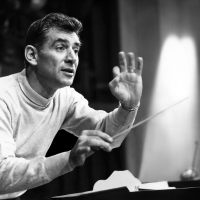Home » Jazz Musicians » Leonard Bernstein
Leonard Bernstein
A presence on Broadway, in Hollywood, at Carnegie Hall and the New York Philharmonic, Leonard Bernstein was a major force in twentieth century music. His exuberant and dramatic style caught the heart of America, bringing classical music to thousands of people from diverse backgrounds. More than any American conductor before him, Bernstein expanded the audience of classical music while maintaining a deep artistic integrity. Bernstein was born in Lawrence, Massachusetts in 1918. His parents were first generation Jewish immigrants from Russia. Though he began learning the piano at age ten, his family hoped he would follow a more practical route, and sent him to the Boston Latin School. After graduating, he attended Harvard University, where he majored in music. His interest was in becoming a concert pianist, but upon graduating he began to seriously study orchestration at the Curtis Institute of Music in Philadelphia. More important than any of the formal training, however, were the summers he spent in Tanglewood, Massachusetts, studying with the great conductor Serge Koussevitzky. In 1942, Koussevitzky invited Bernstein to be the assistant conductor at Tanglewood. Though very young for a conductor, his flamboyant style and emotionally charged performances caught the attention of others in the classical music community--one of whom was Arthur Rodzinzki, who appointed him assistant conductor of the New York Philharmonic. It was at the New York Philharmonic that Bernstein got his big break. Asked to fill in for an ailing guest conductor, Bernstein (then only twenty-five) conducted a difficult and energetic performance with only an evening's preparation. Impressing all who came, Bernstein found himself on the cover of The New York Times--an instant celebrity. Within two years he was named the director of the New York City Symphony. He spent much of the 1950s conducting, teaching, and becoming involved in composing for non- classical genres. Of his many popular efforts of the time, On the Waterfront (1954), Candide (1956), and West Side Story (1957) are the best known. For On the Waterfront he received an Academy Award, and for nearly everything he did, he received the acclaim of an adoring public. In 1957, Bernstein returned to the New York Philharmonic, where he was to make his greatest contribution to the music world. The versatile musical genius that had made him a success on Broadway and in the classical concert halls of the world, found its true home at Lincoln Center. For the next eleven seasons, Bernstein would energize the Philharmonic and American classical music in a way no other director had done. Taking advantage of the recent technological advance of television, Bernstein presented classical music to a wider audience. While he toured throughout the world, visiting seventeen different countries, he also concentrated on creating accessible performances for the average American. For both children and adults, he created shows which were both entertaining and educational. By the time of his resignation from the Philharmonic, he had conducted nine hundred and thirty nine concerts with the orchestra--an unprecedented amount.
Read moreTags
Maestro: The Leonard Bernstein Story

by Victor L. Schermer
Bradley Cooper Maestro Netflix 2023 This film is what might be called a romantic biopic about “maestro" (and household word) Leonard Bernstein's life and work and his loving but troubled relationship with his wife, the Costa Rican/ Chilean pianist and actor Felicia Montealegre. Yet it has the power and fast-moving energy of a war film like Battleship Potemkin (Mosfilm, 1925 ) or Saving Private Ryan (Paramount, 1998). That's because Bernstein led a warrior-like ...
Continue ReadingBill Charlap And The Bill Charlap Trio Celebrate The Theater Songs Of Leonard Bernstein, Friday, June 17th at 7:30 p.m.

Source:
AMT Public Relations
Leonard Bernstein composed some of the most memorable theater scores of his generation—"West Side Story." “Candide." “On the Town."— but who was the man behind the music? This edition of NJPAC’s Conversations in Concert, hosted by theater insider Ted Chapin, promises to be a thought-provoking evening of stories about the iconic composer-conductor complemented by Bernstein songs. Bernstein’s daughter, Jamie, will pull back the curtain of her father’s complex persona, sharing intimate moments and childhood memories from her book, Famous Father ...
read more
Bill Charlap And Bill Charlap Trio Celebrate The Theater Songs Of Leonard Bernstein At New Jersey Performing Arts Center on January 29

Source:
AMT Public Relations
Saturday, January 29th at 7:30 p.m. at the New Jersey Performing Arts Center Leonard Bernstein composed some of the most memorable theater scores of his generation—West Side Story. Candide. On the Town—but who was the man behind the music? This edition of NJPAC’s Conversations in Concert, hosted by theater insider Ted Chapin, promises to be a thought-provoking evening of stories about the iconic composer-conductor complemented by Bernstein songs. Bernstein’s daughter, Jamie, will pull back the curtain of her father’s complex ...
read more
The Smithsonian Jazz Masterworks Orchestra explores the vast, diverse repertoire of legendary composer Leonard Bernstein on stunning, revelatory new album

Source:
All About Jazz
Legendary composer Leonard Bernstein once called jazz “the ultimate common denominator of the American musical style.” The music made a profound impact on Bernstein’s work, not only in the more explicit “jazziness” of his work in musical theater, but throughout his “serious” orchestral music as well. Jazz artists in turn felt the influence of Bernstein’s innovations, with interpretations of his work recorded by such icons as Bill Evans, Dave Brubeck, Oscar Peterson, Wes Montgomery, Wayne Shorter and countless others. With ...
read more
Bernstein on the Mystery Behind the Music

Source:
Michael Ricci
Imagine this: you drop onto the sofa on a Sunday afternoon, switch on the TV and see a dapper young man with a baton standing before an orchestra and demonstrating the patterns conductors use to lead music in different meters two, three, four and five beats to the bar.
He directs his players in a few examples, bits of Beethovens Ninth and Schuberts Eighth Symphonies, Prokofievs Peter and the Wolf, Waldteufels Skaters Waltz. Then he ups the ante, showing how ...
read more
Leonard Bernstein's 'Peter Pan' Flies Again

Source:
Michael Ricci
Leonard Bernstein's Peter Pan.... Did you hear that right? Almost 60 years after its premiere, an almost forgotten play with music gets its definitive hearing.
Albert Ihde and Ellen Pasternack's nuptials involved much more than the union of two souls -- there was also the ritual joining together of their record collections, which ran a close second for the founding couple behind Santa Barbara Theatre. And when Pasternack first heard Ihde's original recording of Leonard Bernstein's ...
read more
Leonard Bernstein the Original Culture Warrior

Source:
All About Jazz
Since when was 'cosmopolitan' a dirty word? Leonard Bernstein proved that the low and high arts could make beautiful music together. I Feel Pretty: Bernstein's sex appeal didn't exactly hurt his pop-culture popularity.
It is one of those stories that never get old. Once upon a time, a matinee crowd bustled into Carnegie Hall to hear a program led by the visiting German-born conductor Bruno Walter. After taking their seats, the concertgoers learned that the maestro had fallen ill and ...
read more
Bill Charlap Pays Homage to Leonard Bernstein with 'Somewhere' on Blue Note Records

Source:
All About Jazz

























